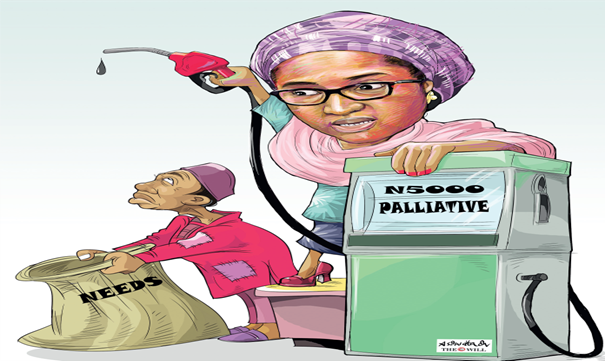[By Abiodun Komolafe ]
Fellow Nigerians, if reports emanating from the grapevine are anything to go by, then, interesting times beckon in 2022. Barring any unforeseen circumstances, the Nigerian government is expected to fully remove the “unsustainable and economically disingenuous” fuel and electricity subsidies next year. In simple terms, the dreaded full deregulation of the oil and power sectors will most likely take effect next year, to pave the way for “market-based”, “cost-reflective” pricing mechanisms. However, the government is said to be ‘forgivingly’ planning a “well-targeted” N5,000-a-month social intervention scheme to cushion the biting effects of poverty on about 40 million vulnerable Nigerians.

Source: The Will
So far, so excruciating! But, from the look of things, it’s like Nigerians ain’t seen nothing yet, given the prevailing socio-economic conditions in the country. Why did I say so? Well, despite the troubling status of Nigeria’s economy, with many Nigerians becoming dangerously poor – the poor remaining poor; or, getting poorer – it is important to note that a certain bloc in the Nigerian power elite still holds the notion that Nigeria’s economy has not only recovered from recession but it is also improving quite remarkably.
Like children born into homes with certain privileges, King Herod and Pontius Pilate became friends and the country is in turmoil. In the view of this privileged clique, statistical indices are all we need to proclaim a healthy economy. Hence, some of them are always quick to heap the blame of the food scarcity currently ravaging Africa’s largest economy on the doorstep of insecurity while the soaring prices of goods and services are blamed on the activities of smugglers.
In a recent edition of ‘Axios’, an American news website, Felix Salmon and Hans Nichols berated Joe Biden’s administration’s use of positive economic indicators to demonstrate signs of strength in the American economy. Echoing the concerns of the broad population of ‘God’s own country’, “who are yet to be convinced”, Salmon and Nichols urged President Biden not “to worry about the economy” but “about what Americans think of the economy.” After all, “consumers don’t live by data points.” Compendiously, people’s experiential knowledge of the reality and dynamics of the economy is what really counts.
Sociological imagination mimics reality and gives an interpretive understanding of the norms and values of a given society or civilisation. In Southwest Nigeria, for example, there is a general belief, which is cosmic to the people. It is the belief in a better tomorrow. In the same vein, society believes in communal togetherness; thus, has developed copious coping mechanisms that help to stabilise the society.
Coincidentally, governments, over the years, have capitalized on this belief; and, have encouraged a laissez-faire attitude on the part of the government towards responsive, good, and accountable governance. To most public servants, the people will not revolt unless instigated by disgruntled elements in the society. This means people should just be muddling through without demanding accountability.
When Fela Anikulapo-Kuti sang that Nigerians were ‘suffering and smiling’, the late Afrobeats king sang like a man who saw tomorrow! Tragically, the society in which he lived had woven a stigma of ‘unseriousness’ around him. Even among the intelligentsia, Fela was seen as one unrepentant, recalcitrant, noisome pestilence, who was only out to rebel against the government for whatever reason.
So, most people did not understand or take him seriously! But, years after the man is gone, Nigerians are beginning to understand the philosophical worth of his songs. Unfortunately, Fela’s songs are as relevant today as they were at the time he sang them, which is also a shame! In saner climes, ‘Abami Eda’ would have been celebrated for possessing enough courage to sing about the state of the nation notwithstanding whose ox was gored. But, ours is a different country, where people of his ilk are not honoured!
Looking at the issues dispassionately, it will not be out of place to conclude that the mismanagement and, consequently, the misfortune of the national economy has, by default, impacted negatively on the federating states. The unbridled national corruption over the years is now crying aloud for reckoning. Evidently, things, indeed, are no longer at ease!
In this part of the country, refilling a 12.5kg cylinder of cooking gas now attracts N9,000.00. Barely a year ago, it was N3,200.00. Around this time last year, a 25kg keg of palm oil went for less than N8,000.00. Now, a 5kg keg of the same product goes for N5,500.00. A measure of gari, which used to cost N100.00 in our very recent past, has now gone up to as much as N400.00.
Ditto for a bag of rice, which has jumped from N7,300.00 in 2015 to N29,000.00! Even a bag of sachet water, aka ‘pure water’, which sold for N100.00 in 2020, now costs N200.00. Rumours even had it that the current retail price per litre of premium motor spirit (PMS) would no longer stand at N162.00; it’s eyeing between N380.00 to N408.00. Amidst these, monthly wages are not increasing. Many states are not paying even the old rates. So, how will an average man cope?
Yes, governments, on paper, always appear as having good intentions; but intentions are not reality. Take for instance: despite the avalanche of churned policies, it is difficult to decipher the way the national government is headed towards solving the myriads of problems currently confronting our country. Terrorism in the North East! Banditry and abductions in other parts of the country! National economic downturn! Investment drought! Criminally scandalous exchange rates; and so many falsehoods being spread, even by the government itself, amid emerging reality. Truth be told, the government appears overwhelmed!
Sad that our democracy has been so reshaped that votes no longer count. Instead, guns and allied violence do the counting; even the collation of results. Announcing the winners is a different ballgame entirely. Interestingly, the configuration of the Nigerian society, as of today, is different from those they lied to, decades ago. The sad reality is that the ends are no longer meeting! The symbolic retrogression is that even those who are now saddled with the power of legitimately providing direction have been fenced out of reality.
What’s more? The nature of corruption in Nigeria impoverishes the mass of the people. Of course, when the falcons can no longer hear the falconers, the gravity of the resultant katakata can only be imagined. Is it any wonder we hear all kinds of problems daily? In any case, wasn’t that one of the factors that gave birth to the #EndSARS campaign?
All said, there needs to be a culture of making the government accountable to the people. It is different from protests. Making the government accountable will curb corruption, improve governance and enhance mass political participation. When the citizens are interested in how they are being governed, the space for corruption and allied criminalities become narrowed. But, if a budget is passed, allocations are distributed, and contracts are messed up, what is left to contend with will be mere noise-making which can only be likened to advice after injury.
May the Lamb of God, who takes away the sin of the world, grant us peace in Nigeria!

- KOMOLAFE writes from Ijebu-Jesa, Osun State
